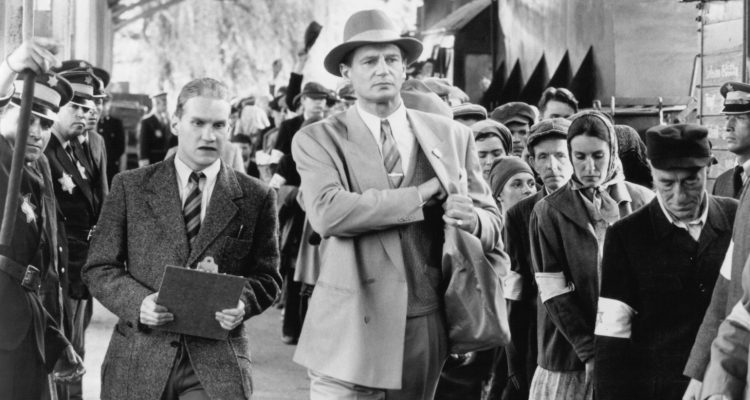Steven Spielberg’s Best Picture winner “Schindler’s List” is revered for a number of reasons, although its use of comedy is often overlooked, and understandably so. The filmmaker’s depiction of the Holocaust is a haunting and masterful look at grief and horror in one of humanity’s darkest hours. But in the midst of great tragedy, there are sometimes moments of levity to be found, and in “Schindler’s List,” that delicate interplay is what ultimately makes the dramatic film more human and, therefore, more affecting. These mixed emotions are explored in “Schindler’s List: Comedy In Tragedy,” a new video essay from A Thousand Words, created by Mac and Daley Nixon.
Throughout “Schindler’s List,” which tells the true story of a Nazi factory owner who saved the lives of his Jewish workers, there are little, sometimes subtle moments of dark irony, which produce some occasionally cathartic moments of humor amidst the unspeakable horrors seen throughout its three-hour running time. These brief moments result in a film that understands the darkness of its drama, but can also provide occasional moments of deadpan reflection.
Comedy and tragedy, as the Nixons are quick to note, have been “bedfellows” since the advent of cinema, especially as comedy was the ideal tool for silent films. Charlie Chaplin’s “The Kid” is used as a distinct example of how the two can be married beautifully. With “Schindler’s List,” however, Spielberg mainly used editing to not only provide some hilarity, but also give us a deeper understanding of the titular character, Oskar Schindler (Liam Neeson). A montage of beautiful women interviewed for a secretary position highlights this notion, and a moment showcasing Schindler’s charisma also helps to cut the tension found in the scene. These are only a few examples found throughout this video essay.
READ MORE: Steven Spielberg’s ‘The BFG’ Is Magical And Imaginative [Review]
Spielberg is often criticized for his sentimentalism, and “Schindler’s List” is no exception. Stanley Kubrick’s famous/apocryphal quote, “ ‘Schindler’s List’ is about success; the Holocaust is about failure,” as paraphrased by Terry Gilliam, is seen and heard, once again, in this video essay. But Spielberg, as an unwavering optimist, ultimately showcases the triumph of humanity even in its darkest moments, a texture that gets some assistance from the use of comedy. To see that proven more elaborately and eloquently, check out this video essay.

